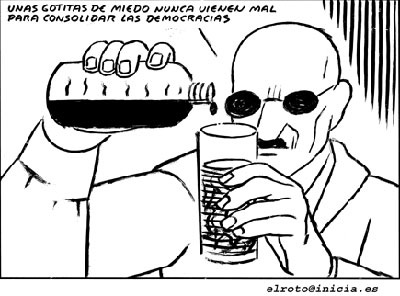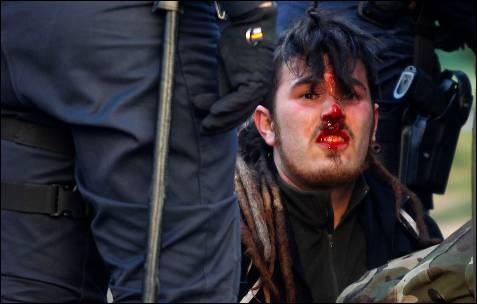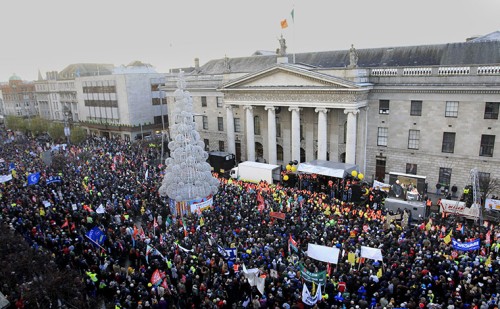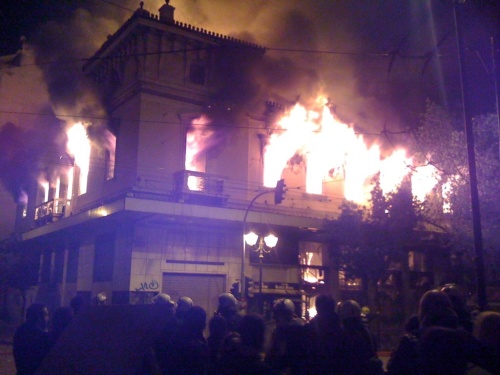I received the following text from a contact the other day, which I have translated. It is written by a collective in Granada, based in the Albaicín, an area of the city that most visitors will be familiar with, where many houses, known as carmens, have traditional Andalusian patios. The area is subject to a lot of property speculation of late. According to my contact, the residents of various carmens have joined together to maintain the houses and have set up various research groups. I like (very much) the poetic and antinomian character of this text, which I have not done that great a job of conveying.
Communiqué in reply to the Report of the Government of the war-world regarding the World Civil War
The Party of the Workers’ Hammer for the New World, Numancia Squadron, and the 4th of December Movement, from their General Headquarters in the Carmen of the Three Stars declare (warn) that:
RULE No. 1
Until a new order every right and all legality is suspended except the law that emanates from the Assembly. With regard to ourselves, we never trusted your laws, we did not seek your protection, we will not pray to a god that does not answer. From this moment right will be constituted by the force that sustains it. We are not going to say it will be a pulse, we are going to say it will be an impulse.
RULE No. 2
We will be considerate. We will respect our laws and whoever fulfils them. Whoever remains outside the Justice that emanates from the assembly of the Common, whoever steals, whoever kills, whoever rapes, will be submitted to the Justice imposed, you will not get off scot-free, if you strike us we will strike you, if you evict us we will evict you, we do not want to talk about phases due to arrive, but watch out copper, the seed of hate is growing.
RULE No. 3
Regarding what you say about Us, this is not true. We are NOT sick. We are NOT disorganised. WE ARE NOT ALONE. On the contrary, we are healthy, strong, we have threaded together the necessary solidarities to make our world habitable. We are a Mafia too. You will not protect anyone from the CHAOS. We protect ourselves from ORDER.
RULE No. 4
Our game does not consist of fleeing, we are positioning ourselves, we are touching down on the ground, given that on the ground you live, one cannot walk, nor eat as one should eat, nor chat, nor be at ease. In fact in the places you live, one cannot live, that is, THAT IS NOT LIFE. You are the ones who are isolated, you live in mousetraps designed to block any type of affection or affinity with your people, you are pale, you do not eat well, you play sport in an obsessive manner, in order to forget what a physical sensation is. YOU ARE REMOVED FROM YOUR BODIES.
RULE No.5
We are not going to flee alone, we are not going to escape one by one. We are going to build our communes, we are going to seek refuge, we are going to be thread-of-what-happens. You should know that we will do all this, except in specific cases, as a group. Our groups are made up of mates and family. All the groups, all the communes, we will get what each other is thinking, we will constitute ourselves by the NO to you and the YES to Us. This has been agreed by consensus in the Assembly, and we are drawing up the RESPONSE.
RULE No. 6
Criminals are our enemy too. Know too that our enemies are de facto criminals since this is why they are our enemies. Realise that you fear us for our potential, you fear our potency. You have done it wrongly, you have a deteriorated system, creaking, cracked, every day that we learn, each time we grow we become aware of your weaknesses, which are many, too many, know that a world without fear nests in our hearts, you who have no heart, fear nests in you, insecurity, doubt, barely can you defend your certainties, you want to flee from the certainties that we sense.
RULE No7
THE REVOLUTION WILL NOT BE INHERITED
RULE No8
We are aware that you can no longer live in your universal desolation, your lack of affection, your lack of attention, you are distant from yourselves you are OUT. We have found ourselves, we are in fact ALREADY complicit. We are friends, we are together and we know that We is a material fact, we have repoliticised the materialism of history and the free market, we are seed and mortar, we dig each other out and we have energy. We are deploying our Defence, if you oblige us we will be ready to attack.
RULE No9
We know that we will come to know prison; you know no other thing.
RULE No10
There will be no more immune blows, all rules are permitted.
The Party of the Workers’ Hammer for the New World, Numancia Squadron, and the 4th of December Movement, from their General Headquarters in the Carmen of the Three Stars, awaiting the response of the rest of the communes of the Coalition of the New Country against the war-world and the Government of the World Civil War.
Granada, seeing the dawn after the long journey of the night of the century.









































